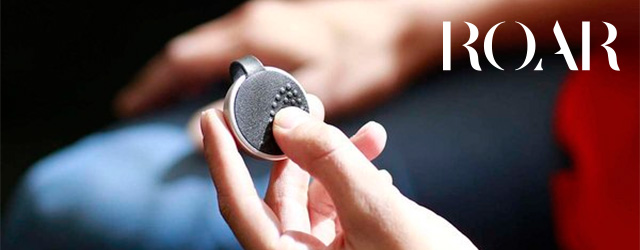Growing pains before wearable alarm is brought to market
Yasmine Mustafa thought she’d be protecting women from attack by now.
But over the last year, the cofounder and CEO of Roar for Good L.L.C., a Philadelphia self-defense technology company, has learned that personal ambition takes a backseat to the frustrating realities of hardware and software development.
“I learn best from my mistakes. It’s fortunate I make so many,” Mustafa said good-naturedly.
She hopes most of them are behind her now that Roar has launched a crowdfunding campaign on Indiegogo for its wearable help-summoning and alarm device, Athena. If the response is positive (the goal: $50,000 through www.philly.com/alarm), manufacturing is expected to begin in December, likely in Taiwan or Korea, with order fulfillment starting in April.
The size of a half-dollar and designed to clip to clothing, a necklace or a keychain, Athena will retail for $99, but is discounted by as much as 40 percent during the Indiegogo campaign. A portion of profits will go to organizations that teach empathy and healthy relationships.
When I first talked to Mustafa, 33, of Center City, in September 2014 about Athena – named after the Greek goddess of courage and wisdom – she planned an Indiegogo campaign in January and to market soon after.
What happened?
“This is supposed to be a product that’s supposed to save your life,” she said. “Making sure we’re doing everything right, making sure we’re not skipping any steps, takes a while.”
Among the lessons learned:
Using part-time contractors, such as industrial designers and electrical and mechanical engineers, limited the time they could dedicate to the project.
Originally, Athena was to emit a bright light and an alarm when activated. Based on input from police and self-defense instructors, who said the element of surprise increases a victim’s chances of escaping an attacker, the device has been redesigned with a louder alarm, requiring less light strength.
While Athena is designed to interact with the wearer’s phone through a Bluetooth chip, developers have not yet solved the problem of getting the device to initiate a 911 call to an emergency contact when it is locked, though they think they are close. (A likely case in an attack scenario, with the phone at the bottom of a purse, for instance.) A text-to-911 feature is working, “but the challenge . . . is that text-to-911 is only available in about 7 percent of counties,” Mustafa said.
The original bracelet design has been scrapped – a person grabbed and left with only one hand free would have had difficulty activating it.
A planned phone app that would notify users of crime patterns in their vicinity and allow them to input their own safety-related observations has been “back-shelved until the hardware is shipped,” Mustafa said. “We were doing too much at one time. . . . It’s a rookie mistake that we fell into and learned from.”
Taking cues from mistakes and adjusting is required of any successful entrepreneur, said Anthony Gold, 50, cofounder and chief technology officer at Roar, whose background includes building IT businesses, providing career-advancement advice, and investing in start-ups.
“I had always been a believer in leveraging technology to address compelling societal challenges,” Gold said. “What made [Roar] so compelling was this idea we don’t just want to put a Band-Aid on a problem and this idea of investing in nonprofits teaching young girls and boys empathy.”
Before its Indiegogo campaign, Roar had raised $250,000 from local investors, including $100,000 from a Main Line couple who want to remain anonymous. Funding also came from Ben Franklin Technology Partners, DreamIt Ventures, and Untours Foundation.
“For an investor, Roar is the whole enchilada – two entrepreneurs with a track record, a product for all demographics, and understanding that we must teach empathy,” said Elizabeth Killough, Untours’ manager.
The Media-based business-support agency has made a $20,000 equity investment in Roar and is not nervous about the setbacks.
“This is part of app development,” Killough said.





